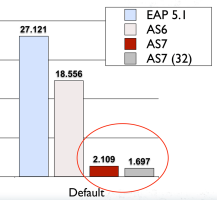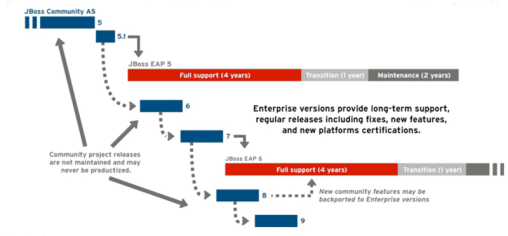JBoss 7 with improved memory use and faster startup
 Just over six months after the release of JBoss 6, Red Hat has released version 7 of the Java Application Server. The developers of the open source product highlight the new release's improvements in memory utilisation and deployment, as well as the significantly reduced starting time of the default configuration. The improvements come from having a more modular architecture. Version 7 has been certified for the "web profile" developed in parallel with Java Enterprise Edition 6 (Java EE). This profile only includes technologies that are used in a typical Java web application. While the actual certification for Java EE 6 is missing in the new version of JBoss, it is likely to be added in the near future.
Just over six months after the release of JBoss 6, Red Hat has released version 7 of the Java Application Server. The developers of the open source product highlight the new release's improvements in memory utilisation and deployment, as well as the significantly reduced starting time of the default configuration. The improvements come from having a more modular architecture. Version 7 has been certified for the "web profile" developed in parallel with Java Enterprise Edition 6 (Java EE). This profile only includes technologies that are used in a typical Java web application. While the actual certification for Java EE 6 is missing in the new version of JBoss, it is likely to be added in the near future.

![]() The default configuration of JBoss 7 appears to be starting significantly faster than the previous version and the current commercial variant
The default configuration of JBoss 7 appears to be starting significantly faster than the previous version and the current commercial variant
Source: Red Hat
Other new features include the support of Java Context and Dependency Injection (CDI - JSR 299), Arquillian testing which improves support for TDD (Test Driven Development), and a new modular service container and domain model that replaces the micro containers of JBoss 5 and 6 and allows the system to run on small devices. Together with new management APIs and a more sophisticated domain model, JBoss 7 should be capable of scaling up to high-performance, automated servers and clusters. JBoss Developer Studio has been adapted for the new functionality and integrates with the Eclipse development environment; it has also had its support for development with CDI, Hibernate, REST and Web Service improved.
Scheduled for release in early 2012, Red Hat's JBoss Enterprise Application Platform 6, the commercial distribution of the application server, will be based on JBoss 7. At the end of July, the developers plan to integrate the application server into the OpenShift Platform-as-a-Service (PaaS) that Red Hat announced back in May.
Another change that will affect the future of JBoss is that, with JBoss 7, the developers have detached the release cycle of the open source version from that of the commercial product. In future, it is expected that, similar to the jump from JBoss 6 to JBoss 7, which were developed in parallel, new open source versions will be released at short intervals, while the Enterprise Application Platform will remain at version 6. The Enterprise Application Platform has a seven-year support cycle, and new features from the community version are added to it on a regular basis without a version jump.

![]() The developers are detaching the release cycle of the community edition from that of the Enterprise Application Platform
The developers are detaching the release cycle of the community edition from that of the Enterprise Application Platform
Source: Red Hat
(djwm)
![Kernel Log: Coming in 3.10 (Part 3) [--] Infrastructure](/imgs/43/1/0/4/2/6/7/2/comingin310_4_kicker-4977194bfb0de0d7.png)

![Kernel Log: Coming in 3.10 (Part 3) [--] Infrastructure](/imgs/43/1/0/4/2/3/2/3/comingin310_3_kicker-151cd7b9e9660f05.png)
















